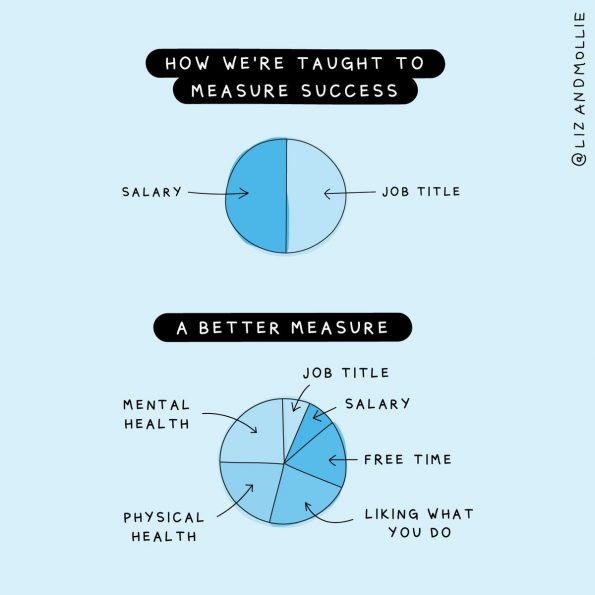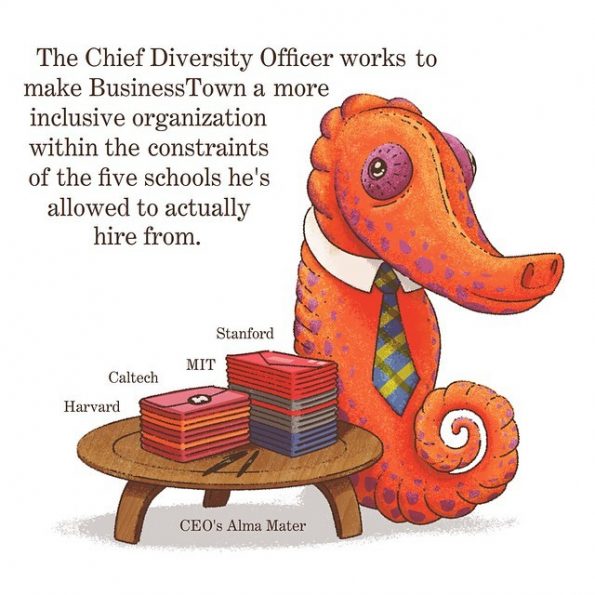This picture from Liz and Mollie showed up on my Twitter feed a few times recently:
And that reminded my of one of my favorite (?) BusinessTown posts:
Not because they’re pointing at the exact same thing, but because they’re both pointing at monocultures within how businesses (or at least tech business, or at least Silicon Valley tech startups) make choices. And it feels like there should be more room for experimentation there, that companies that actively explore niches in how they run their business should be able to get a competitive advantage?
Take hiring fresh grads an as example. I have nothing against the schools mentioned in the BusinessTown post; but I also feel like there are a lot of companies out there that are trying to hire from that list of schools. (Or from the same short list of big tech companies, when looking beyond fresh grads.)
And the outcome that I would expect out of that is that most companies that are trying to hire from that pool end up looking relatively undifferentiated to job applicants, at which point they have a hard time hiring good applicants from that pool. So they instead end up either not hiring at all or else hiring not particularly impressive applicants from that pool or else getting into a salary arms race with companies that have a lot more money available.
It feels to me like a better strategy would be to find a different pool to hire from, one that doesn’t have as many companies looking at it. And then, even if we accept for the sake of argument that the average quality of the second pool is lower than the average quality of the first pool, if we can choose between the best candidates from the second pool versus undistinguished candidates from the first pool, we should come out better, right? I feel like it’s a good play to take your chances trying to find the best CS grad from some not-particularly-prestigous-but-perfecly-fine state school over a middle-of-the-read CS grad from MIT.
And the same thing goes for the Liz and Mollie diagram, either when hiring employees or trying to retain them. Rather than just fighting with salary, job titles, and (for the retention case) inertia, why not pick one of the other dimensions and try to make your company really good along that dimension?
Sure, if you actively work on making your company an awesome place for whole humans to be, or at least for humans who care abnormally about one particular dimension of their lives, then you’ll lose out when trying to snag people who aren’t motivated by that dimension but who are motivated by money or company cachet or working on the trend of the day. But is your company one that has enough money or cachet or trendiness to win the battles along those dimensions? If not, I’d think you’re better off to pick an unpopular dimension to compete along, and compete there.
Which is easier said than done, to be sure. Like, on the one hand I don’t believe in whiteboard coding as a strong signal. But, on the other hand, I’ve spent enough time in situations where whiteboard coding feels like a natural question to ask that I can (I think!) tell when somebody is doing a good job at that. And maybe I can even tell that they’re doing a good job in ways that show some of the virtues that that person would have if we hire them. (I don’t think that whiteboard coding skill is necessarily completely irrelevant to ones’ contributions as an employee, just that it filters out lots of people who either are strong at different skills or who don’t perform well under that sort of artificial pressure.)
Whereas if we start selecting from pools that don’t tend to produce the sorts of people who do well on that particular metric, then that means that we have to start figuring out other ways to evaluate people, to find other dimensions along which people could excel. That way, we can find those people even if they don’t show up in more traditional metrics.
And that’s hard. I don’t really know how to do that; managers, recruiters, and HR people that I’ve worked with also haven’t shown themselves as particularly good at doing that. So there’s this selection / skills bias at that level, too: it’s not just that we have blind spots in the pools / skills that we look for, we have weak areas in our detection abilities, too.
There’s a similar issue with the sorts of measures that Liz and Mollie bring up. Companies will talk about their values statements, or the No Asshole Rule, or supporting work-life balance. But it’s hard to act in a way that’s motivated by values if those values cause your company to make hard decisions. It’s hard to kick out assholes who look productive and who aren’t really that bad, are they? It’s hard to figure out how to really let people disconnect from work when everybody says we should be doing DevOps and a few alerts a week is pretty good all things considered.
So I guess that a big part of the answer is: none of this stuff is free. Even if, ultimately, there’s a hiring strategy or a cultural strategy out there that will give better results than your current strategy at no extra steady state cost, there’s still the cost of finding and learning how to execute on that strategy; and that cost is real.
And probably another part of the answer is: while it sometimes feels to me that there are huge numbers of tech firms out there, enough that some of them should be stumbling on some of these better ideas, it’s also the case that I’ve actually spend my time in a small and incestuous subset of those tech companies (venture backed Silicon Valley ones, or ones that grew out into the public markets out of venture backing). And that pool might be too small to get this sort of experimentation. And also, it raises the question of whether these changes, even if potentially beneficial for employees of those companies, would be beneficial for the VC firms that fund them; those groups’ incentives aren’t particularly well aligned in general, which adds extra complexity to the optimization problem.
Which, in turn, points at a potential third answer to all of this: probably there are lots of companies out there doing the sorts of things that I’m talking about here, I’m just ignorant of them because of my parochial standpoint! That’s actually almost certainly the case, now that I type it out; something I should work on.
Post Revisions:
This post has not been revised since publication.


 Posts
Posts